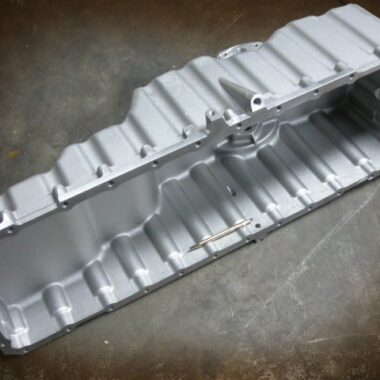Aluminum Spreading Solutions Unveiled: Crucial Insights and Tips
Discovering the world of aluminum spreading services can unveil a world of complex procedures and nuanced factors to consider that are essential for successful results. As we venture right into the world of aluminum spreading solutions, prepare to reveal the key elements that can form the trajectory of your projects and elevate your understanding of this elaborate craft.
The Fundamentals of Aluminum Spreading
What essential processes are involved in aluminum spreading that form the foundation of this widely used manufacturing strategy? Light weight aluminum spreading is a functional and cost-efficient approach utilized in different markets to produce facility and detailed steel parts. The procedure begins with the melting of aluminum ingots in a furnace, commonly at temperature levels varying from 1220 ° F to 1670 ° F, relying on the details light weight aluminum alloy being utilized. Once molten, the aluminum is put into a pre-designed mold and mildew tooth cavity, where it solidifies and takes the shape of the mold and mildew.
After solidification, the mold is eliminated, and the spreading undertakes finishing processes such as warm therapy, machining, and surface area finishing to satisfy the called for requirements. Understanding these fundamental processes is vital for accomplishing high-grade light weight aluminum spreadings with specific dimensions and mechanical residential or commercial properties.
Different Casting Methods Explained
Checking out the numerous techniques utilized in light weight aluminum casting provides beneficial insights right into the diverse techniques made use of to achieve exact and complex steel parts. One common technique is sand casting, where a mold and mildew is developed using compacted sand around a pattern of the preferred part. One more technique, pass away spreading, entails infusing liquified aluminum into a steel mold under high pressure.
Elements to Consider When Picking a Service Provider
When choosing an aluminum casting solution copyright, evaluating their experience and know-how is critical for ensuring high quality and integrity in the production procedure. The provider's experience in the area suggests their knowledge with various spreading strategies, prospective difficulties, and finest practices. It is important to ask about the kinds of tasks they have actually dealt with in the past, ensuring they align with the complexity and specs of your own project.
Furthermore, consider the provider's online reputation within the market. Search for testimonials, endorsements, and instance research studies that demonstrate their capacity to deliver high-quality aluminum spreadings regularly. A reliable copyright will typically have qualifications or affiliations with sector organizations, showcasing their dedication to excellence and adherence to sector criteria.
Additionally, analyze the supplier's capacities in regards to personalization, quantity requirements, and job timelines. Ensure that they can fit your particular demands and have the flexibility to scale manufacturing as required. Reliable interaction and transparency pertaining to costs, lead times, and quality assurance procedures are also essential variables to consider when picking an aluminum spreading provider.

Typical Difficulties and Solutions
Navigating with the complexities of light weight aluminum casting processes frequently presents producers with a series of obstacles that call for cutting-edge options to guarantee efficiency and top quality in manufacturing. One usual obstacle dealt with in aluminum spreading is the formation of defects such as porosity, shrinkage, or incorporations because of inappropriate mold style or inadequate steel high quality. These defects can endanger the structural honesty of the last product. To resolve this, producers need to carry out complete simulations and tests to maximize the casting procedure parameters and make certain the high quality of the molds and materials made use of.
An additional challenge hinges on attaining precise dimensional accuracy, particularly for intricate geometries. Variations in cooling prices, mold expansion, and material buildings can lead to variances from the desired measurements. Implementing sophisticated innovations like computer-aided style (CAD) and computer numerical control (CNC) machining can enhance accuracy and consistency in aluminum spreading. In addition, maintaining correct control over the melting and pouring processes is essential to protect against concerns like getting too hot or irregular circulation of the liquified steel - casting aluminum. By purchasing automation and real-time tracking systems, makers can enhance process control and minimize variations, ultimately enhancing the total top quality of light weight aluminum actors items.
Tips for Optimizing Your Casting Projects
To boost the effectiveness and high quality of your aluminum casting tasks, carrying out calculated optimization techniques is important. One key pointer for enhancing your casting projects is to meticulously create the gating system. By making certain that the gating system is well-designed and effectively put, you can improve the circulation of molten light weight aluminum and minimize the chances of defects in the last casting. Furthermore, utilizing computer system simulations can assist in examining the flow and forecasting of metal throughout the casting procedure, enabling modifications to be made before real production begins.

Final Thought
Finally, understanding the fundamentals of light weight aluminum spreading, different casting approaches, factors to find more information take into consideration when selecting a company, usual challenges and services, and pointers for optimizing casting jobs are crucial for effective outcomes. By adhering to these insights and applying best practices, individuals and services can guarantee reliable and reliable light weight aluminum casting services that satisfy their specific requirements and needs.
Comprehending these fundamental processes is necessary for accomplishing top quality aluminum spreadings with specific measurements and mechanical homes.
When picking an aluminum casting solution copyright, assessing their experience and experience is essential for making certain top quality and reliability in the production process. Efficient interaction and openness regarding prices, lead times, and quality control procedures are also important aspects to take into consideration when choosing an aluminum casting solution supplier.
Browsing with the intricacies of light weight aluminum look here spreading procedures website here typically offers manufacturers with a series of challenges that need innovative options to ensure effectiveness and quality in manufacturing. One common challenge faced in aluminum spreading is the development of flaws such as porosity, shrinking, or incorporations due to improper mold style or inadequate steel quality.